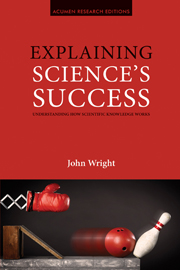Book contents
- Frontmatter
- Contents
- 1 Some surprising phenomena
- 2 Some unsatisfactory explanations of the phenomena
- 3 A defeasible a priori justification of induction
- 4 The independence of theory from data
- 5 Some more success-conducive properties of theories
- 6 Newton's laws of motion and law of gravitation
- 7 Special relativity
- 8 Mendelian genetics
- 9 Conclusion
- Notes
- Bibliography
- Index
1 - Some surprising phenomena
- Frontmatter
- Contents
- 1 Some surprising phenomena
- 2 Some unsatisfactory explanations of the phenomena
- 3 A defeasible a priori justification of induction
- 4 The independence of theory from data
- 5 Some more success-conducive properties of theories
- 6 Newton's laws of motion and law of gravitation
- 7 Special relativity
- 8 Mendelian genetics
- 9 Conclusion
- Notes
- Bibliography
- Index
Summary
Paul Feyerabend famously asked, “What's so great about science?” (1976: 310). One possible answer is that it has been surprisingly successful in getting things right about the natural world. And, very plausibly, a reason why science has been of interest to philosophers is because it seems to have been more successful in doing this than non-scientific or pre-scientific systems, or religion, or philosophy itself. We seem, moreover, to be able to point to some general ways in which science has been surprisingly successful in getting things right. Here are three such:
Scientists have formulated some theories that have successfully predicted novel observations.
Scientists have produced theories about parts of reality that were not observable or accessible at the time those theories were first advanced, but the claims about those inaccessible areas have since turned out to be true.
Scientists have, on occasion, advanced on more or less a priori grounds theories that subsequently turned out to be highly empirically successful.
Of course, it may be disputed whether these phenomena really are genuine. But if they are genuine, they are surprising, and therefore require explanation. The main aim of this book is to offer an explanation of these phenomena. The aim of the present chapter is to argue that there are phenomena here that genuinely do require explanation.
THE FIRST PHENOMENON
The first of the phenomena is that scientists have formulated theories that have subsequently turned out to have novel predictive success. Observational predictions made by scientific theories are, roughly speaking, of two kinds: predictions of observations that are of the same kind as those on the basis of which the theory was initially formulated and predictions that are of a new or different kind from those initially used. Suppose a scientist is studying magnets. The scientist may note that all magnets observed so far have two “poles”, a north and a south pole. This leads to the conjecture that all magnets have both a north pole and a south pole.
- Type
- Chapter
- Information
- Explaining Science's SuccessUnderstanding How Scientific Knowledge Works, pp. 1 - 12Publisher: Acumen PublishingPrint publication year: 2012



